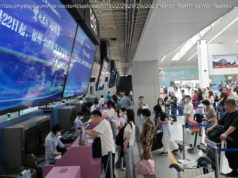Beijing calls for restraint as violence follows US decision to move embassy to Jerusalem
China has offered to play a part in the Middle East peace process, saying on Saturday that it would work to bring Israeli and Palestinian representatives together for a forum on possible solutions.
The offer comes amid renewed conflict following US President Donald Trump’s decision to recognise Jerusalem as Israel’s capital and move the US embassy there.
The violence prompted the Chinese embassy in Israel to warn its citizens in the country to “stay vigilant”. It said they should be cautious when travelling to conflict areas including the old city of Jerusalem, the West Bank, Gaza and the Israel-Lebanon border.
Addressing a foreign ministry forum in Beijing on Saturday, Foreign Minister Wang Yi said China supported the establishment of an independent Palestinian state with East Jerusalem as its capital but both sides should exercise restraint.
“China will try hosting a peace symposium between Palestinians and Israelis this year, and continue playing a constructive role to resolve the Palestinian-Israeli issue,” he said.
China held similar gatherings in 2006 and 2013.
China has extensive economic and military ties with Israel, particularly in infrastructure. Chinese companies are building a mass transit system for the Tel Aviv metropolitan area and a new cargo port at Ashdod on the Mediterranean coast.
Chinese travellers to Israel put on alert as Donald Trump’s Jerusalem move intensifies tensions
Trade between China and Israel has accelerated rapidly, rising to US$11.4 billion in 2015 from just US$1.1 billion in 2000. China is now Israel’s third-biggest trading partner after the United States and the European Union, and its second-largest export destination.
In March, Chinese President Xi Jinping met Israeli Prime Minister Benjamin Netanyahu and both countries agreed to upgrade their relations to “comprehensive innovation partnership”.
In addition, China is a growing source of visitors, with 76,400 Chinese tourists visiting Israel between January and November last year, a rise of 60 per cent from 2015.
But China also maintains strong ties with the Palestinians.
In July, Chinese President Xi Jinping told Palestinian Authority President Mahmoud Abbas that China supported the two-state solution.
China has offered to arrange meetings between Israelis and Palestinians before, including in 2013 when China hosted Netanyahu and Abbas in the same week. But the offer was never taken up.
Pan Guang, vice president of the Chinese Association for Middle East Studies, said China would push for peace talks but was unlikely to raise proposals to settle the conflict.
Why is China so worried about Trump recognising Jerusalem as Israel’s capital?
“The symposium may be a platform for people to discuss ideas and hope to alleviate tensions a little, but it is hard for China to bring forward a specific solution,” he said.
Xiao Xian, dean of the school of international relations at Yunnan University, said China had tried to promote peace talks in the past but it was very difficult.
“The mediation now is largely done by the US and the United Nations,” he said.






